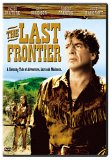| Reviews & Columns |
|
Reviews DVD TV on DVD Blu-ray 4K UHD International DVDs In Theaters Reviews by Studio Video Games Features Collector Series DVDs Easter Egg Database Interviews DVD Talk Radio Feature Articles Columns Anime Talk DVD Savant Horror DVDs The M.O.D. Squad Art House HD Talk Silent DVD
|
DVD Talk Forum |
|
|
| Resources |
|
DVD Price Search Customer Service #'s RCE Info Links |
|
Columns
|
|
|
Last Frontier, The
The film takes place during the last days of the Civil War, where out in the wilderness the dregs of the U.S. Cavalry continue to encroach upon Indian land. Illiterate trappers Jed Cooper (Mature), Irishman Gus (James Whitmore), and half-breed Mungo (Pat Hogan) are ambushed by an Indian tribe led by Chief Red Cloud (Manuel Donde). Unhappy with the "blue coat's" new forts and their "civilization," Red Cloud takes his frustrations out on the trappers, who never bothered anybody. Robbed of their guns, their horses, and a year's worth of trap, the three make their way to Fort Shallan, where Captain Glenn Riordan (Guy Madison) offers the men jobs as scouts.
Meanwhile, martinet Col. Frank Marston (Robert Preston), having lost his own fort to Indian raids, also makes camp at Fort Shallan, and as senior officer takes command. A reckless leader, Marston is already responsible for the death of 1,500 men at the Battle of Shiloh, and his blood-lust against the local Indians is barely concealed. Against everyone's advice, he insists on launching a suicidal attack against Red Cloud, and the future of Fort Shallan is very much in doubt.
Adapted from Richard Emery Roberts' novel The Gilded Rooster, Philip Yordan** and Russell S. Hughes's screenplay is an overly symbolic character study contrasting the uneducated, uncivilized and undisciplined but good-natured Cooper with the reckless and dangerously irresponsible Marston. Where Gus and Mungo are reluctant to hire themselves out as scouts, Cooper is attracted to military life, and aspires to become a genuine soldier. He enjoys imitating their salute and late in the story wears a cavalry jacket he had earlier found on the body of a dead Indian. (Marston, significantly, says he's "not a man without" his uniform.) Cooper's childlike admiration for the Cavalry and disillusionment watching Marston's abuse of power destroy what it stands for is the heart of the film, but it doesn't amount to much.
Part of the problem is that Marston is simply a Bad Guy with little shading, though the screenwriters try to add some through his loveless relationship with wife Corinna (Anne Bancroft, her hair dyed blonde). Cooper and Corinna also have a brief romance, which isn't believable given her relative sophistication and his Neanderthal-like manners. Marston is an uninspired variation of Henry Fonda's Thursby from the much-superior Fort Apache, and lacks that character's subtle arrogance.
All things considered, Mature comes off surprisingly well. An underrated talent, he was very good within a very limited range, playing larger-than-life men of action, often blind-sided by events that call into question the direction of their lives. Mature was actually quite good in The Robe (1953) and its sequel, Demetrious and the Gladiators (1954), both enormous hits, and later in films like After the Fox (1966), which poked fun at his screen persona. In contrast Preston and Bancroft, both better actors than Mature, are far removed from their strengths and flail about helplessly. Only James Whitmore, in another fine character piece, makes any impression.
Video & Audio
The Last Frontier is presented in its original CinemaScope aspect ratio in a 16:9 anamorphic transfer. Like nearly all the earliest CinemaScope films, the image is grainy and muddy, in this case compounded by the frequent use of day-for-night photography. Nevertheless, the transfer probably is accurate in approximating the film's look when it was new. The 3.0 Dolby Stereo comes alive here and there, mainly during the incongruous title song, a rousing and upbeat number contrasting the downbeat story. Optional English and Japanese subtitles are available. There are no Extra Features.
Parting Thoughts
The Last Frontier could rightly be labeled a psychological Western in the Mann style, but it's ordinary where it ought to have more personality, obvious where it should be subtle, preachy where it should be straightforward.
**Around this time Yordan fronted for numerous blacklisted writers, and even now it's not entirely clear which scripts he actually wrote, and which were written by others using his name.
Stuart Galbraith IV is a Kyoto-based film historian whose work includes The Emperor and the Wolf - The Lives and Films of Akira Kurosawa and Toshiro Mifune and Taschen's forthcoming Cinema Nippon. Visit Stuart's Cine Blogarama here.
|
| Popular Reviews |
| Sponsored Links |
|
|
| Sponsored Links |
|
|
| Release List | Reviews | Shop | Newsletter | Forum | DVD Giveaways | Blu-Ray | Advertise |
|
Copyright 2024 DVDTalk.com All Rights Reserved. Legal Info, Privacy Policy, Terms of Use,
Manage Preferences,
Your Privacy Choices | |||||||














